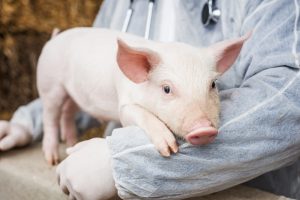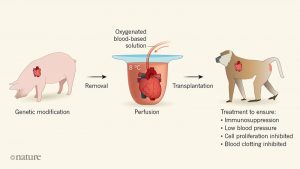Pigs have always been synonymous with lazy and useless. But do you know that the pig is a living science treasure? In the eyes of scientists, it is possible to dig up new scientific treasures all over a pig’s body. In the future, human beings may have to borrow human organs from them.

Scientists say they have successfully kept a baboon alive with a pig’s heart for six months. (Credit: Dusan Petkovik/Shutterstock)
Statistics About Pigs Used in Scientific Fields
In modern science, the pig is one of the most ideal and important experimental animals, playing an important role in medicine and other fields. The most recent report on pigs’ use in the U.S. from 2017 revealed that 51,020 pigs were used in research protocols that year, representing a 12% increase in use from 2014.
Reasons for Why Pigs Used in Research Fields
Scientists usually use model animals to understand particular biological phenomena. The classic model animals we often hear are rats, fruit flies, and zebrafish. However, due to their long distances from human evolution, they cannot completely mimic the occurrence of human diseases. But pigs are different. They are closer to human and have anatomical structures and physiological functions close to human. Especially in the digestive system, cardiovascular system, metabolic processes, and other aspects are very similar. Therefore, the scientific value of taking pigs as research models is very large.
Miniature pigs with an adult weight of about 30 kg were selected as experimental varieties. They are characterized by small size, genetic stability, easy feeding, and easy operation. At the same time, it also meets the experimental requirements of genetic stability and small differences in physiological indexes among individuals.
Achievements Scientists Earned So Far
Nowadays, scientists have successfully applied ingredients extracted from the pig into medicine people may take.
A research team led by Bruno Reichart at the University of Munich in Germany has developed a technique allowing 4 baboons successfully implanted in the heart of a pig. They survived more than 90 days after receiving a heart transplant. The longest of them survived for 195 days, far exceeding the record of non-human primate xenotransplantation.
The significance of Xenotransplants Hearts
Although figuring out how to safely xenotransplant hearts is still an important area of study to be extensively explored, demand for organs outpaces supply can be met in a possible way.
Imagine if your heart is exhausting and anxiously waiting for a new heart. After waiting for the right donor, the doctor called to tell you at this time that the donor is not a human but a pig. It sounds like a science fiction bridge, but it may indeed be realized in the near future.
— Jianping Gao

